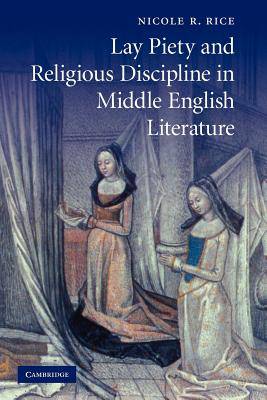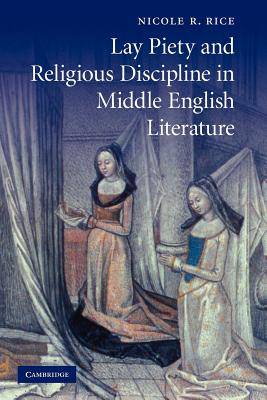
- Afhalen na 1 uur in een winkel met voorraad
- Gratis thuislevering in België vanaf € 30
- Ruim aanbod met 7 miljoen producten
- Afhalen na 1 uur in een winkel met voorraad
- Gratis thuislevering in België vanaf € 30
- Ruim aanbod met 7 miljoen producten
Zoeken
Lay Piety and Religious Discipline in Middle English Literature
Nicole R Rice
€ 66,45
+ 132 punten
Uitvoering
Omschrijving
In late-fourteenth-century England, the persistent question of how to live the best life preoccupied many pious Christians. One answer was provided by a new genre of prose guides that adapted professional religious rules and routines for lay audiences. These texts engaged with many of the same cultural questions as poets like Langland and Chaucer; however, they have not received the critical attention they deserve until now. Nicole Rice analyses how the idea of religious discipline was translated into varied literary forms in an atmosphere of religious change and controversy. By considering the themes of spiritual discipline, religious identity, and orthodoxy in Langland and Chaucer, the study also brings fresh perspectives to bear on Piers Plowman and The Canterbury Tales. This juxtaposition of spiritual guidance and poetry will form an important contribution to our understanding of both authors and of late medieval religious practice and thought.
Specificaties
Betrokkenen
- Auteur(s):
- Uitgeverij:
Inhoud
- Aantal bladzijden:
- 270
- Taal:
- Engels
- Reeks:
- Reeksnummer:
- nr. 73
Eigenschappen
- Productcode (EAN):
- 9781107404656
- Verschijningsdatum:
- 8/03/2012
- Uitvoering:
- Paperback
- Formaat:
- Trade paperback (VS)
- Afmetingen:
- 152 mm x 229 mm
- Gewicht:
- 399 g

Alleen bij Standaard Boekhandel
+ 132 punten op je klantenkaart van Standaard Boekhandel
Beoordelingen
We publiceren alleen reviews die voldoen aan de voorwaarden voor reviews. Bekijk onze voorwaarden voor reviews.











